Abstract
In order to give full play to the advantages of power battery and super-capacitor in the hybrid energy storage system (HESS) of hybrid electric vehicles (HEV), a new control strategy based on the subtractive clustering (SC) and adaptive fuzzy neural network (AFNN) was proposed to solve the problem of power distribution between the two energy sources when the driving schedule changes. Firstly, we used the SC to determine the structure of AFNN. Secondly, in order to improve the learning efficiency of AFNN, the back-propagation hybrid least square algorithm was applied to optimize the antecedent and conclusion parameters of network. Finally, the fuzzy membership function and rule set automatically generated by the neural network were used to the power distribution control of HESS in HEV. We verified the SC and AFNN control strategy by simulation and experiment based on the ADVISOR 2002 simulation software and the experimental platform, and the results show that the proposed control strategy can give full play to the advantages of HESS, and improve the energy storage performance of HEV.











Similar content being viewed by others
Data availability
The datasets generated during the current study are available in the [Replication Data for: Cluster Computing] repository, [https://doi.org/10.7910/DVN/WBL9IE].
References
Zhou, M.L., Wang, J.M., Chen, Q.L.: Research on vehicle controller and control strategy for pure electric vehicle with composite power. Int J Electric and Hybrid Vehicles 2, 170–193 (2019)
Gao, J.W., Li, M., Hu, Y.F., Chen, H., et al.: Challenges and developments of automotive fuel cell hybrid power system and control. SCIENCE CHINA Inf. Sci. 62, 51201–51225 (2019)
Marx, N., Hissel, D., Gustin, F., Boulon, L., et al.: On the sizing and energy management of an hybrid multistack fuel cell–battery system for automotive applications. Int J Hydrogen Energy. 42, 1518–1526 (2017)
Bizon, N.: Real-time optimization strategy for fuel cell hybrid power sources with load-following control of the fuel or air flow. Energy Convers Manage. 157, 13–27 (2018)
Tahri, A., Fadil, H.E., Belhaj, F.Z., et al.: Management of fuel cell power and supercapacitor state-of-charge for electric vehicles. Electric Power Syst Res. 160, 89–98 (2018)
Hong, Z.H., Li, Q., Han, Y., et al.: An energy management strategy based on dynamic power factor for fuel cell/battery hybrid locomotive. Int J Hydrogen Energy. 43, 3261–3272 (2018)
Liu, Y.W., Zhu, Y.X., Lin, Z.Y., et al.: Energy management strategy optimization of hybrid energy storage system based on Radau Pseudo-spectral Method. Automot. Eng. 41, 625–633 (2019)
Zhou, M.L., Liu, Z.H., Guo, J.M.: Control strategy of hybrid electric vehicle. J Harbin Univ Sci Technol. 24, 41–47 (2019)
Boumediene, A., Khadidja, A., Brahim, M.: Energy management of PEM fuel cell/supercapacitor hybrid power sources for an electric vehicle. Int J Hydrogen Energy. 42, 21158–21166 (2016)
Jeongwon, S., Myoungho, S., Kyunghan, M., et al.: Power management strategy for the 48 V mild hybrid electric vehicle based on the Charge-Sustaining control. Int J Automotive Technol. 20, 37–49 (2017)
Singh, A., Pattnaik, S.: Design of an efficient power sharing strategy for a battery-ultracapacitor hybrid energy storage system. 2016 IEEE 1st International Conference on Power Electronics (ICPEICES). Delhi, India, 4–6 July. 1–5(2016).
Hu, Y., Li, W.M., Xu, K., et al.: Energy management strategy for a hybrid electric vehicle based on deep reinforcement learning. Appl. Sci. 8, 1–15 (2018)
Shi, L., Zheng, M.G., Li, F.Y.: The energy management strategy for parallel hybrid electric vehicles based on MNN. Multimedia Tools App. 79, 5321–5333 (2020)
Mohamad, F.M., Kumeresan, A.D., Mohd, F.R.: Improved fuel economy of through-the-road hybrid electric vehicle with fuzzy logic-based energy management strategy. Int J Fuzzy Syst. 20, 2677–2692 (2018)
Masoud, M., Masoud, D.: A novel power distribution system employing state of available power estimation for a hybrid energy storage system. Appl. Energy 228, 2478–2489 (2018)
Chen, H., Lin, C.X., R.: Online adaptive energy management strategy for a hybrid energy storage system in electric vehicles. Trans China Electrotech Soc. 35, 644–651 (2020)
Sun, Z.Q., Deng, Z.D., Zhang, Z.X.: The theory and technology of Intelligent control. Tsinghua University Press, Beijing (2011)
Chandar, S.K.: Stock market prediction using subtractive clustering for a neuro fuzzy hybrid approach. Clust. Comput. 22, 13159–13166 (2019)
Khalil, B., Ali, C.: Clustered ANFIS network using fuzzy c-means, subtractive clustering, and grid partitioning for hourly solar radiation forecasting. Theoret. Appl. Climatol. 137, 31–43 (2019)
Kokkinos, Y., Margaritis, K.G.: Kernel averaged gradient descent subtractive clustering for exemplar selection. Evol. Syst. 9, 285–297 (2018)
Fei, J.T., Wang, T.T.: Adaptive fuzzy-neural-network based on RBFNN control for active power filter. Int J Machine Learning and Cybernetics. 10, 1139–1150 (2019)
Dinibel, P.B., María, P.N., Amalia, M.: Comparison of adaptive neuro-fuzzy inference system and recurrent neural network in vertical total electron content forecasting. Neural Comput. Appl. 31, 8411–8422 (2019)
Zhang, Q., Hu, L., Gow, J.: Output feedback stabilization for MIMO semi-linear stochastic systems with transient optimisation. Int. J. Autom. Comput. 17, 83–95 (2020)
Zhang, Q., Zhou, J., Wang, H., Chai, T.: Output feedback stabilization for a class of multi-variable bilinear stochastic systems with stochastic coupling attenuation. IEEE Trans. Autom. Control 62, 2936–2942 (2016)
Zhang, X.P., Zhang, X.H., Li, D., et al.: Adaptive synchronization for a class of fractional order time-delay uncertain chaotic systems via fuzzy fractional order neural network. Int J Control Autom Syst. 17, 1209–1220 (2019)
Wang, R.M., Zhang, Y.N., Chen, Y.Q., et al.: Fuzzy neural network-based chaos synchronization for a class of fractional-order chaotic systems: an adaptive sliding mode control approach. Nonlinear Dyn. 100, 1275–1287 (2020)
Li, C.I., Chen, G.D., Sung, T.Y., et al.: Novel adaptive kalman filter with fuzzy neural network for trajectory estimation system. Int J Fuzzy Syst. 21, 1649–1660 (2019)
Senthilkumar, C., Gnanamurthy, R.K.: A Fuzzy clustering-based MRI brain image segmentation using back propagation neural networks. Clust. Comput. 22, 12305–12312 (2019)
Huang, Y.J., Li, Z., Ye, H.C., et al.: Mapping soil electrical conductivity using ordinary kriging combined with back-propagation network. Chin. Geogra. Sci. 29, 270–282 (2019)
Zou, W.D., Xia, Y.Q.: Back propagation bidirectional extreme learning machine for traffic flow time series prediction. Neural Comput. Appl. 31, 7401–7414 (2019)
Chao, Z., Kim, H.J.: Brain image segmentation based on the hybrid of back propagation neural network and Ada-boost system. J Sign Process Syst. 92, 289–298 (2020)
Liu, J., Wang, Y., Wu, Y.J., et al.: Research and implementation of new-type supercapacitor and battery hybrid energy storage system. J Power Electron. 20, 1395–1404 (2020)
Zhang, Q., Li, G.: A predictive energy management system for hybrid energy storage systems in electric vehicles. Electr. Eng. 101, 759–770 (2019)
Wang, Z.S., Wang, P., Bi, H.K., et al.: A bidirectional DC/DC converter with wide-voltage gain range and low-voltage stress for hybrid-energy storage systems in electric vehicles. J Power Electron. 2(20), 76–86 (2020)
Masoud, M.T., Mohammad, R.H., Vahid, E., et al.: Wavelet-based power management for hybrid energy storage system. J Modern Power Syst Clean Energy. 7, 779–790 (2019)
Rajesh, A.V.: Hybrid energy storage system for electric vehicle using battery and ultracapacitor. Adv Electrical Comput Technol. 672, 1203–1214 (2020)
Acknowledgements
The research described in this paper was financially supported by Changzhou key research plan (Applied Basic Research) project (Grant No. CJ20200044) and the basic science (Natural Science) research project of colleges and universities in Jiangsu Province (Grant No. 22KJD470002).
Funding
The research described in this paper was financially supported by Changzhou key research plan (Applied Basic Research) project (Grant No. CJ20200044) and the basic science (Natural Science) research project of colleges and universities in Jiangsu Province (Grant No. 22KJD470002).
Author information
Authors and Affiliations
Contributions
All authors contributed to the study conception and design. Material preparation, data collection and analysis were performed by QW, and YL. The first draft of the manuscript was written by QW and all authors commented on previous versions of the manuscript. All authors read and approved the final manuscript.
Corresponding author
Ethics declarations
Conflict of interest
The authors have no relevant financial or non-financial interests to disclose.
Additional information
Publisher's Note
Springer Nature remains neutral with regard to jurisdictional claims in published maps and institutional affiliations.
Rights and permissions
Springer Nature or its licensor holds exclusive rights to this article under a publishing agreement with the author(s) or other rightsholder(s); author self-archiving of the accepted manuscript version of this article is solely governed by the terms of such publishing agreement and applicable law.
About this article
Cite this article
Wang, Q., Luo, Y. Research on a new power distribution control strategy of hybrid energy storage system for hybrid electric vehicles based on the subtractive clustering and adaptive fuzzy neural network. Cluster Comput 25, 4413–4422 (2022). https://doi.org/10.1007/s10586-022-03687-z
Received:
Revised:
Accepted:
Published:
Issue Date:
DOI: https://doi.org/10.1007/s10586-022-03687-z




